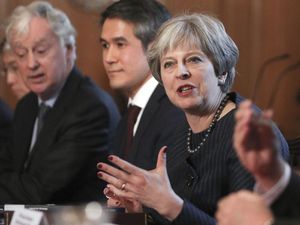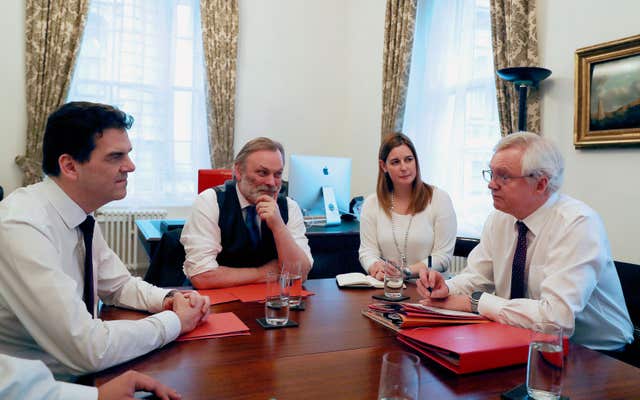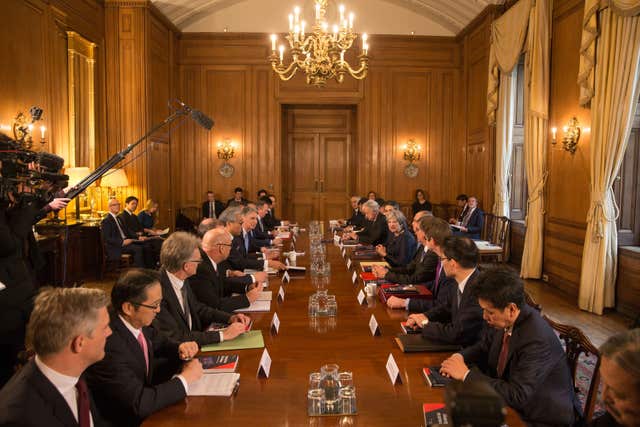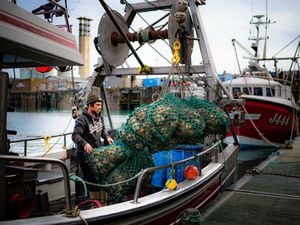PM urges Brexit Cabinet to be ‘bold’ but agree plan with ‘widespread support’
Theresa May’s inner Brexit ‘war cabinet’ met on Thursday without agreeing a plan for negotiations on a future relationship with the EU.

Theresa May has urged senior ministers to be “bold” in aiming for a unique post-Brexit relationship with the European Union but warned it must command “widespread support”.
The Prime Minister delivered her message during a two-hour meeting of her inner “war cabinet” on Thursday which failed to agree on what future UK-EU trade relationship to pursue during negotiations.
Downing Street has refused to comment on reports that Mrs May ordered ministers on the Brexit subcommittee to an away day at Chequers later this month to resolve their differences.
And attention will first turn to a Friday update from EU chief negotiator Michel Barnier on this week’s technical negotiations on a transition deal to cover a period of around two years after the UK leaves the bloc in March 2019.
The planned time-limited period is designed to provide certainty to businesses, but the Cabinet is also under intense pressure to agree a negotiating position on what will follow the transition.
On Thursday night, a Number 10 source said: “The PM told the Brexit Cabinet that the Government had to be ambitious in the deal we seek.
“She said her starting point was to aim for something that hadn’t been done before in order to come to a new relationship that will last a generation or more.
“Her approach is to seek a deal that is bold, in the best interests of the UK and that will carry widespread support.”

But the atmosphere around the issue has soured after Brexit Secretary David Davis criticised the “discourteous” EU for publishing plans that would allow it to sanction the UK during the transition.
Turning up the heat as technical talks drew to a close, Mr Davis said he regarded the Brussels documents as “political”, “unwise” and not in “good faith”.
He was referring to an EU position paper showing it wants to put in place a method to rapidly curtail the UK’s single market benefits if it breaches the terms of a transition deal.
Mr Barnier could strike back at Friday’s press conference in Brussels, where Mrs May’s key Brexit adviser Olly Robbins is due to provide an update to officials on the UK’s plans.

Japan’s ambassador to the UK Koji Tsuruoka said there were “high stakes” and firms would not be able to continue operating unless they could remain profitable.
Mrs May told the gathering Brexit was “no small undertaking” but presents an opportunity to “strike free trade deals around the world and build on our already strong relationship with Japan”.

He stressed it would be “technically very unlikely” regulations would be passed before the transition ends, as the timescale would be too tight following European Parliament elections in 2019 and the establishment of a new European Commission in autumn that year.
Meanwhile, the Government issued a technical note calling on the EU and more than 100 countries with which it has international deals with to treat the UK as if it were a member state so signed agreements on the likes of trade, nuclear cooperation and aviation can continue to function during the transition.
“This would be achieved by agreement of the parties to interpret relevant terms in these international agreements, such as ‘European Union’ or ‘EU Member State’, to include the UK,” the document said.
A series of European Commission documents warned companies what would happen in the event of a “no deal” Brexit.
Among the consequences outlined, UK finance companies would lose their “passporting rights” and “will no longer be allowed to provide services in the EU”.





